OPINION: Imagine a Muslim Brotherhood without Turkey—or Iran
If Iran is honest in its intentions toward Saudi Arabia, it would reevaluate its approach toward non-state actors and once-allied Islamist organizations like the Muslim Brotherhood, Hamas, Houthis and maybe Hezbollah.
The Middle East has recently been rocked with deep political shifts, with longtime arch-foes ending years-and even decades-long standoff. Egypt and Turkey agreed to mend relations and start procedures of exchanging ambassadors. Saudi Arabia and Iran have signed a historic rapprochement deal.
Ironically, Turkey and Iran are backers of the Muslim Brotherhood organization—though at varying degrees. Turkey has sacrificed diplomatic relations with Egypt in exchange for unflinching support for the Muslim Brotherhood over the last decade. For the same reason, Iran has always been at loggerheads with successive Egyptian governments.
However, Saudi Arabia and Egypt have been fighting the organization’s ideology for a while now, which has always put Riyadh on the opposing sides of alliances in which Turkey or Iran have been engaged.
The most urgent question now is: How far these rifts and internal cleavages will shape the Muslim Brotherhood’s future given the shifting alliances that put the organization—designated terrorist in Egypt and many major Middle Eastern nations—in an unfavorable position?
The Muslim Brotherhood has forged strong ties with likeminded organizations in the Islamic world—both Sunni and Shiite.
It has strong ties with all Islamist parties in Turkey—including those opposed to President Recep Tayyip Erdoğan such as Felicity Party—with the hope of one day establishing a globalist government in as many major Islamic countries as possible in what is called in the Muslim Brotherhood’s ideology as “Mastership of the World”, a principle whose foundations had been laid by the group’s founder Hassan al-Banna.
The Brotherhood’s rise to power in 2012 in tightly contested elections—in which the Brotherhood’s candidate Mohammed Morsi narrowly defeated former army general Ahmed Shafik—was a godsend for Erdoğan and his government as well as Iran, whose government embraces an Islamist, globalist ideology deemed the Shiite variant of the Muslim Brotherhood’s ideology.
The Muslim Brotherhood forged ties with Twelver Shiite Iran before the Sunni Turkey. This is because ‘Islamic’ governance was established in Iran approximately two and a half decades before Turkey. With the victory of the Khomeini-led Islamic revolution, many Muslim Brotherhood senior officials praised the revolution, seeing it as a ray of hope for their long-awaited Islamic project.
The late Muslim Brotherhood figure Kamal al-Hilbawi, who once served as the Muslim Brotherhood’s spokesman, was captured on television praising Iran, its supreme leader, and the Islamic revolutions. He had made numerous visits to the Shiite country.
When he was in power, late Egyptian President Mohamed Morsi made major efforts to “pursue a different strategy” to Iran than any previous Egyptian governments. He hosted former Iranian President Mahmoud Ahmadinejad in Cairo, sparking outrage among all of Morsi’s opponents, particularly the Salafis, who saw Twelver Shiism as their archenemy and the most serious threat the country has ever faced.
Notwithstanding their reservations about Morsi’s position on Syria, the Iranians hailed his election and saw him as a huge opportunity to infiltrate the Arab world. They have even provided advice on how the Muslim Brotherhood ‘protect the revolution’, advising them to establish their own version of Iran’s Revolutionary Guards.
Likewise, Turkey’s Erdoğan was boosted by Morsi and the Brotherhood’s rise to power. But Erdoğan’s dream was short-lived. The Muslim Brotherhood’s government was unseated following mass protests that prompted the army to intervene to ‘prevent the country from sliding into chaos and civil strife’. Morsi was ousted, the Brotherhood has lost power and Erdoğan has missed out on the opportunity of having the most powerful Arab country on his side.
The Muslim Brotherhood’s ouster was immensely shocking to Erdoğan. He initially refused to acknowledge that they had left. He was acting as though it was only a matter of time before they were restored to power. Nonetheless, the Brotherhood has lost strength and clout on the Egyptian street, with the organization’s social, political, and economic clout dwindling to historic lows.
He had embarked on launching scathing attacks on the Egyptian government and El-Sisi personally. After withdrawing Turkey’s ambassador from Egypt, Erdoğan remarked that “he will never respect people who gain power through armed means.” He supported the Brotherhood and its protests, transforming his country into a stronghold for the organization’s anti-regime activities.
However, because political blunders have been the Muslim Brotherhood’s trademark for the past nine decades, they have failed to hold power. The Egyptian government has managed to nearly wipe out the organization’s clout and their popular incubators. This utter failure—albeit shocking and disappointing—has forced Erdoğan to fundamentally alter his stance and make overtures to the regime he once declared “he does not respect.”
Not only has the Muslim Brotherhood failed to depose the Egyptian regime and return to power, but it has also lost Erdoğan’s trust. The group’s camp, led by former secretary general Mahmoud Hossein, was claimed to have made overtures to the Felicity Party, which is regarded the Turkish variant of Egypt’s Muslim Brotherhood and has long been at odds with Erdoğan and his AK Party.
Erdoğan was briefed on Felicity Party communications and was incensed by the Egyptian organization’s move. Erdoğan has decided to change alliances and forsake the Brotherhood. It seems that Erdoğan has realized that the Brotherhood has been attempting to stab him in the back. He deemed the move ungrateful and decided to make them pay the price, turning to their arch-foe El-Sisi. Thus, Cairo and Ankara decided to hold talks. The talks were slow and cautious, focusing chiefly on security matters.
The Muslim Brotherhood has long sold itself as a unified organization with a single leader, single line, and a single hierarchy. However, this has turned out to be a massive deception. Immediately after losing power in 2013, the Brotherhood suffered major splits, primarily over how to confront the political crisis they were faced with and how to respond to their humiliating loss of power.
A faction chose nonviolent protests as a temporary strategy, while others were more daring, deciding to play hardball with Egypt’s government. These schisms have never abated, with the Turkey-based wing, led by Mahmoud Hossein, claiming to be the sole legal representative of the imprisoned supreme guide Mohammed Badie.
A new acting supreme guide was elected after a lengthy period of intense power struggles, internal betrayals, and back-and-forth barter of blame within the organization—over political, administrative, and even financial issues. Salah Abdel-Haq was elected in place of the late Ibrahim Mounir, who was based in London.
As a result, it appears that as time passes, more allies are forsaking the Muslim Brotherhood. Not only has Turkey broken with the Brotherhood, but Iran is also poised to follow likewise. Following the rapprochement agreement with Saudi Arabia, Iran is making bold moves, making great strides, and embarking on unforeseen initiatives.
If Iran is honest in its intentions toward Saudi Arabia, it would reevaluate its approach toward non-state actors and once-allied Islamist organizations like the Muslim Brotherhood, Hamas, Houthis and maybe Hezbollah. The latter will almost certainly lose its Shiite ally as well. Historically, the organization has performed poorly in power—and it is lousy at power plays. In its relationship with the Brotherhood—and the other non-state actors—Iran is the puppet master; it always pulls the string. And if it determines that its partnership with the Muslim Brotherhood is no longer beneficial and obstructs it from carrying out its regional agenda, it will most likely distance itself from the organization.
On balance, the Muslim Brotherhood is in shambles. It has lost its most strong ally, Turkey, and might easily lose Iran due to current political developments. The new Muslim Brotherhood leadership is still operating in a hazy environment. The organization’s difficulties and disputes remain unresolved, and divisions remain unhealed. There are various varieties of the Muslim Brotherhood, each with its own set of connections and affiliations, all of which serve the interests of its respective wings.
The Muslim Brotherhood has been incredibly successful in one area over the last decade: failure. It failed to maintain its coherent organization, strong leadership, and reliable alliances. The new leadership takes over at a time when the group is on fragile ground, with no significant bases of support at home or reliable allies outside. The new leadership could be part—or a sign—of the organization’s current and future failures—unless a miracle happens.
Mostapha Hassan Abdelwahab is the former editorial manager of the English edition of the Baghdad Post. He is focusing on Iraq, Iran and political Islam movements, with articles posted on the Herald Report, Vocal Europe, the Greater Middle East and other platforms.
Disclaimer: Views expressed by writers in this section are their own and do not reflect Milli Chronicle’s point-of-view.



